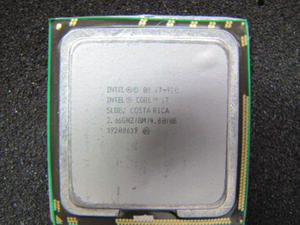Counterfeit chipsIndustry: government hampering efforts to fight counterfeit chips
Representatives from the semiconductor industry said that new Treasury Department and U.S. Customs and Border Protection (CBP) policies have made it difficult to assist the Pentagon in its struggle to keep counterfeit computer components out of its supply chain; Brian Toohey, the president of the Semiconductor Industry Association, a lobbying group, said that new policies introduced in 2008 by the Treasury Department and CBP have made it difficult for manufacturers to identify counterfeit products

A counterfeit Intel Core i7 processor // Source: coated.com
A representative from the semiconductor industry representatives said that new Treasury Department and U.S. Customs and Border Protection (CBP) policies have made it difficult to assist the Pentagon in its struggle to keep counterfeit computer components out of its supply chain.
Testifying before the House Homeland Security Subcommittee on Oversight, Investigations, and Management last month, Brian Toohey, the president of the Semiconductor Industry Association, a lobbying group, said that new policies introduced in 2008 by the Treasury Department and CBP have made it difficult for manufacturers to identify counterfeit products.
Toohey explained that prior to 2008, government officials would send complete photographs of suspected counterfeits to help companies identify fakes, but now agencies only send partially blacked out photos which the manufacturers say are of no use.
He added that rooting out counterfeit chips is particularly crucial as they can lead to dangerous equipment failure or make it easier for foreign hackers to infiltrate government networks.
“It’s very clear that there are significant numbers of (counterfeit) semiconductors that are making it through to military supply chains,” he said. “The implications (of) that, from a reliability perspective, from a failure perspective, are very serious.”
For instance, crews at a U.S. Navy air base recently discovered a counterfeit microchip in a night-attack Marine Corps fighter jet.
Robert P. Ernst, the head of the Naval Air Systems Command anti-counterfeiting team, investigated the issue and found that the chip, which was used in the jet’s night control systems, did not contain lead in its solder joints and could therefore cause the chip to fail and disrupt the plane’s controls.
Meanwhile Bill Chu, the department chair of software and information systems at the University of North Carolina at Charlotte, is particularly concerned about the ability for foreign spies to use these counterfeit chips to steal information.
A contaminated device can act as a “Trojan horse” for foreign hackers that could jeopardize the entire network. These types of attacks are hard to detect and could allow malicious actors to steal mass quantities of information without being noticed.
“The focus is not as much on quality as it is on espionage,” he said. “People are really worried about it, particularly in national security. People are really worried about building critical systems with off-the-shelf parts,” especially when the parts are built overseas.
The complex global supply chain puts every country at risk, not just the United States, said Jim Lewis, a senior fellow at the Center for Strategic and International Studies.
“The threat of a contaminated supply chain is a risk, but it’s a risk that everybody has, because it’s a global supply chain,” he said.
In response to Toohey’s testimony, after the hearing Representatives Joe Barton (R-Texas) and John Dingell (D-Michigan) sent letters to DHS Secretary Janet Napolitano and Treasury Secretary Timothy Geithner requesting an explanation of why the agencies changed their policies in regards to supplying industry partners with information on counterfeit chips.
“During this hearing it was brought to our attention that Customs and Border Protection employs a policy that seems to impair the government and private sector efforts to combat intellectual property theft,” they wrote.
The Congressmen have yet to receive a response from the Treasury Department, while DHS said that it had not changed its policies since 2000.
“At no point has CBP altered its official position on the type or degree of information it is authorized to disclose with respect to intellectual property enforcement,” wrote Alan D. Bersin, the commissioner of CBP, in his response letter.
Toohey said that it was possible that the agency’s policy was not implemented until 2008.
He added, “As more and more technologies use microelectronics for more and more things, and there is more and more money to be made. … I think this problem is not going away.”
The Government Accountability Office is expected to investigate the Pentagon’s policies on counterfeits in the near future while the Senate Armed Services Committee initiated its own inquiry in March.
